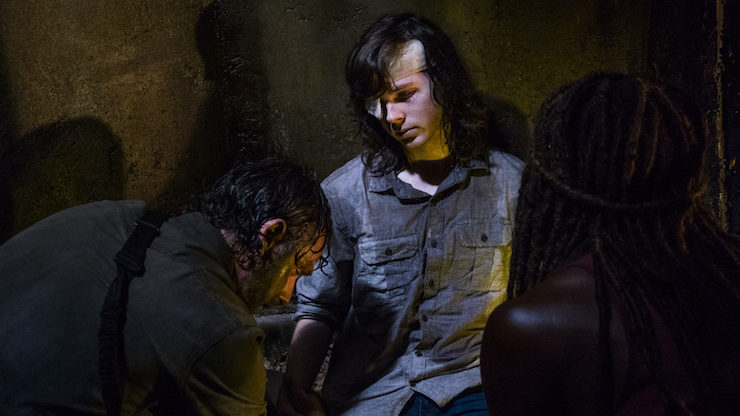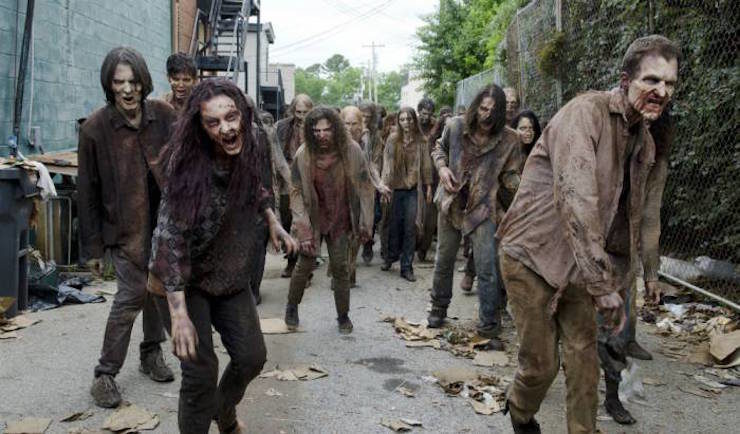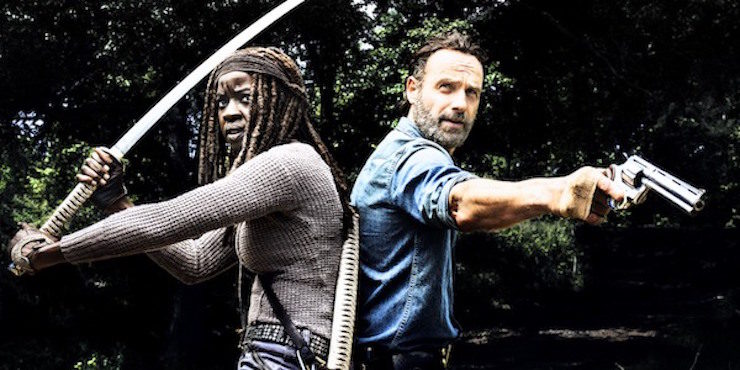The Walking Dead, which returns for the second half of its eight season this Sunday, finds itself in the midst of interesting times. Yet again. It feels like overly familiar territory, at this point. The Walking Dead is a show that excels at pushing its luck, knowing full well that there is fertile ground out beyond its viewers’ comfort zones—and trusting them to follow it loyally, out and back again.
In the first half of this season, for the first time, it may genuinely have gone too far.
The season’s main plot followed the war with the Saviors. The show is always at its strongest when focusing on the ideological and personal levels and this was no exception. The season did great work as it explored the different ideologies of the human settlements, and the way those ideologies clashed. It also used the personal choices of several surprising characters to demonstrate how those massive ideas collapse down into human frailty and choice. Daryl, Dwight, and Eugene in particular all had some really meaty material to work with as they found their personal needs running up against “greater good” that none of them fully believed in anymore.
All of this eventually combined (along with some welcome context and depth for the Saviors) into a narrative that poses the most interesting question the show has ever asked itself:
The world has, by and large, finished ending. Now what?
The comic answered this question by jumping forward in time to explore a newly unified world, and the different threats facing it. That remains one of the bravest choices I’ve ever seen a western mainstream comic series make, and it’s one the show hinted strongly that it would adapt. The first episode of Season 8 featured flash-forward sequences featuring an old, bearded Rick in a peaceful community, accompanied by Michonne and his children, that looked, all in all, a lot like the flash-forward in the comics.
And then, as the show reached its mid-season finale, Carl Grimes was bitten.
The series changed forever. The fans were furious. That idyllic future was a lie.

The Walking Dead has a history of pulling this sensationalistic P.T. Barnum stuff. Glen was infamously “killed” a season before his eventual death in a manner that was clearly designed as a publicity stunt. At the time it was grumbled at, but accepted by fans, by and large, as part of the price of admission. In a series set in such a brutal world and featuring such a large cast, viewers have to be kept on their toes.
But this latest twist feels different, on several levels…not the least of which is the crushing denial of hope that it represents. The show has, rightly at times, been criticised for being endlessly, inescapably, and relentlessly grim. Carl’s survival, and the fact that Rick’s family was still intact, played a major part in allowing many viewers to maintain hope. Now, that’s no longer the case and a series that has made a habit of tearing its own heart out over and over is, once again, looking down at the hole in its chest and wondering how it will ever get filled. It will, as it has been before, but that doesn’t make this any easier to take, at the moment.
Then there’s the trust issue. The Walking Dead is already on thin ice with a sizeable percentage of its viewers, and in that context, this feels more like a cheap shot than a legitimate attempt at a surprising twist. The fact it landed in the same half season where the show went two for two on “Here’s a happy gay couple! …AND ONE IS DEAD NOW” doesn’t help matters. And again, it brings us back to the fundamental conflict between a show about the end of the world and the fact that people like seeing those characters, and getting invested in them. If they don’t stay long enough, they get treated unfairly—as basically every black male character who isn’t Morgan or Ezekiel has been. Stay too long, and the wrench when the character leaves alienates the very people it should be keeping glued to their seats.
That in turn leads to the most ephemeral damage this has done and also the most important. The relationship between the show and its viewers has changed irrevocably and may well take a long time to recover. Carl was one of the original characters, actor Chandler Riggs has literally grown up on screen and TWD fandom has embraced both him and their perceived role in his childhood. The persistent reports, albeit unconfirmed, that plans for Riggs changed on no notice has done nothing but enrage a fandom tired of endless grim dark and sensation even further.
It’s interesting to note then that things behind the camera are being shaken up, too. Long-term showrunner Scott Gimple is being promoted to heading the overall Walking Dead franchise. Given the colossal improvement that Fear The Walking Dead showed last season, and the imminent crossover, that’s no surprise.

What most definitely is a surprise is who’s replacing him. Angela Kang’s appointment as showrunner is historic. This is a woman of colour being put in charge of one of the most high-profile TV shows in the world and somehow that seems to have gone weirdly under-reported. Kang is a fantastic choice, a producer and writer with years of experience who has had a hand in many of the show’s best hours. It’s far too early to get an idea of what she’ll change, but if I had to guess, I’d say that Gimple’s fondness for over-the-top shock tactics will leave with him. Kang is a character-facing author, whose work is innovative, grounded, and smart. She’s great. And she’ll need to be.
The Walking Dead finds itself in interesting times. Again. The major difference this time is that the show has pulled what can surely be the last bait and switch it will ever be able to. The death of Carl Grimes—and the final, catastrophic severing from comics continuity it brings with it—will change the story forever, but it has to change how the show tells that story, as well. Angela Kang’s appointment suggests that the production is aware of that fact, and taking steps to address it. Whether or not that will be enough to regain the trust (and continued interest) of most viewers remains to be seen—but it’s the best possible first step out of the hole in which the show now finds itself.
Alasdair Stuart is a freelancer writer, RPG writer and podcaster. He owns Escape Artists, who publish the short fiction podcasts Escape Pod, Pseudopod, Podcastle, Cast of Wonders, and the magazine Mothership Zeta. He blogs enthusiastically about pop culture, cooking and exercise at Alasdairstuart.com, and tweets @AlasdairStuart.










